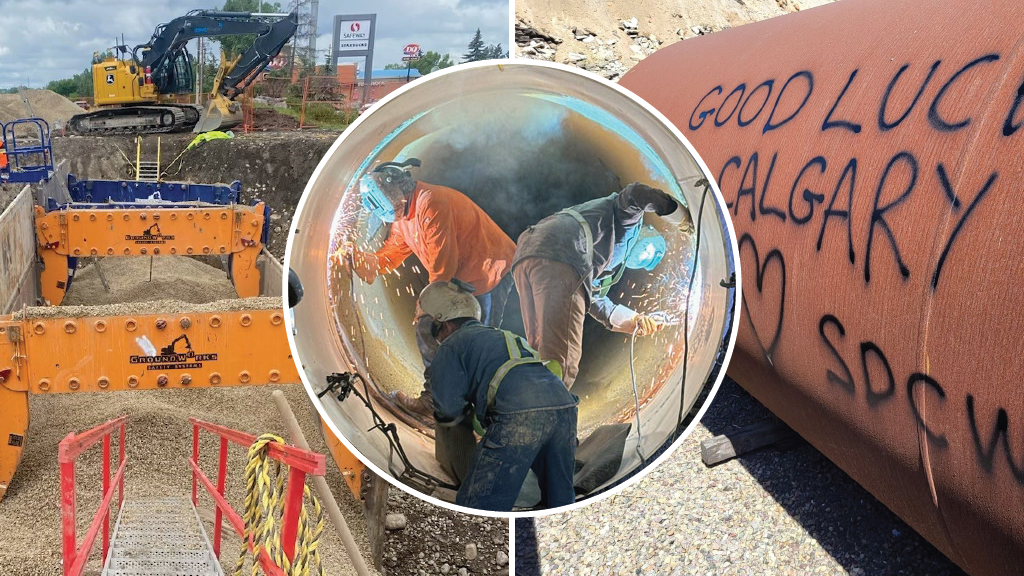Like everyone else in Calgary, the city’s construction industry has been struggling to keep its head above water since June 5.
That’s when Calgary Emergency Management enacted its Municipal Emergency Plan to deal with a water feeder main break that cut the city’s water supply in half.
After the city put a ban on outdoor fires at the beginning of the emergency, it looked like many construction sites would have to be shut down.
“The fire department was worried about not having enough water to fight a fire and didn’t want to increase the risk by having open flames on construction sites,” said Bill Black, president and CEO of the Calgary Construction Association (CCA).
Fortunately, the construction industry, city administration and the fire department have been working together to keep disruption of construction work to a minimum.
On June 10, the CCA put out a note on social media that the fire ban would make it hard for the city’s roofers to do their jobs.
“The decision to ban all ‘hot works’ in #Calgary has left at least 800 roofers without work during a prime construction period. We urge the CFD (Calgary Fire Department) to reconsider and implement a balanced, safety-first solution that doesn’t halt the construction industry,” said the CCA post.
In response to the CCA’s request, Fire Chief Steve Dongworth said some of the restrictions were being relaxed “as we see increased confidence in the water supply within the city, as water services have done a great job of topping up the reservoirs around the city.”
Black, for his part, said, “We appreciate the CFD’s recognition of the importance of roofing work involving hot air welding and cold processes roofing in new construction projects.”
The activities in question are taking place on the condition that worksites maintain a fire watch.
This includes a mandatory 60-minute fire watch post-application, and a follow-up inspection four hours after the completion of work, along with the provision of additional fire extinguishers.
Karen Rutherford, executive director of the Alberta Roofing Contractors Association, said about 70 per cent of the roofers it represents in Calgary have returned to work.
“We are currently working on risk management plans to allow hot works,” said Rutherford. “We have worked with the CCA to achieve partial return to work. We have all benefited from co-operating with others who share our concerns.”
Russ Evans, executive director of the Mechanical Contractors Association of Alberta (MCA), which has around 90 contractor members in the Calgary area, said the association found out about the fire ban from some of its members.
“We had discussions with other trade association leaders that also do hot work, as well as Bill Black at CCA, whom we know works with the city on construction-related issues,” said Evans. “Initially the restrictions were all-encompassing, and companies were required to shut down the hot work portion of a jobsite.”
Now, thanks the restrictions having been eased, “We have not heard of anyone not being back at work,” said Evans. “The fire chief was very responsive to the concerns we brought forward. The exemption was issued within 24 hours of our initial contact with the CFD.”
Evans said Alberta’s safety guidelines for performing plumbing hot work are clear and have evolved over time to eliminate the risk of fire.
“I believe having them in place provided the assurance the CFD needed to confidently issue an exemption,” he said.
Evans said Calgary’s construction industry learned some valuable lessons from the COVID-19 pandemic emergency that helped it work together to deal with the water emergency.
“The quick joint response by the members and their associations was a good reminder of what can be accomplished by working together,” he said.
The city said the watermain that fractured early in the month was half-way through its 100-year life cycle.
After further assessment of the pipe, five other vulnerable spots of concern were identified.
On June 15, the city declared a State of Local Emergency. In addition to municipal crews, six private sector partners have been engaged to help with the work.
Two round table sessions with experts in related fields took place over the June 15-16 weekend. Two more sessions, involving heavy construction and tech sector experts, are also scheduled to take place.
“It was a real co-operative effort between industry, the fire department and the mayor’s office,” said CCA’s Bill Black. “The fire department has been amazing to work with.
“At the end of this, CCA will put together a document summarizing the emergency, construction’s reaction to it and lessons learned that we’ll make available to industry.”

